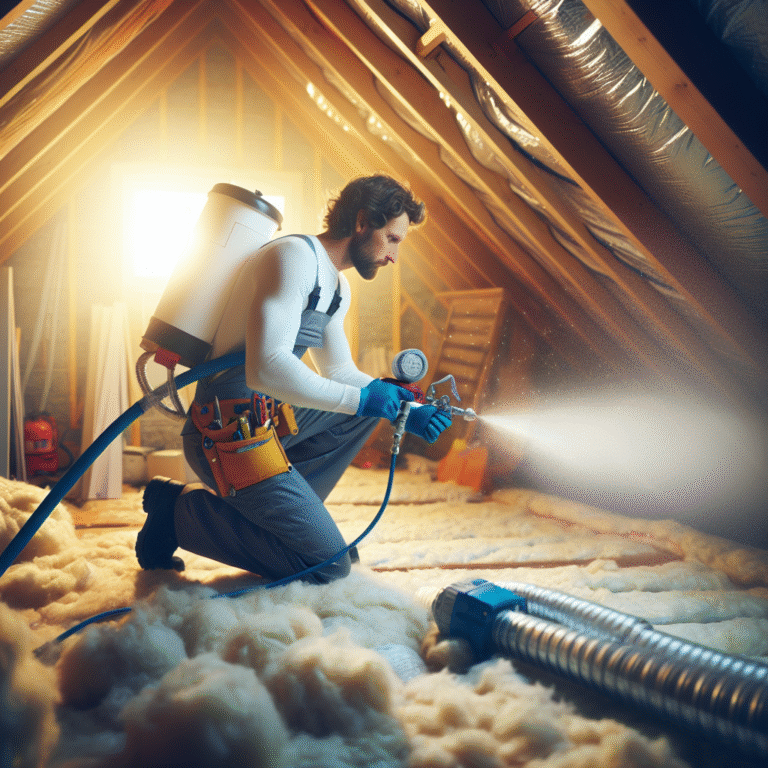Maximize Energy Savings with Houston’s Ultimate Attic Insulation Guide 2
Introduction
Attic insulation is one of the most cost-effective upgrades you can make to your Houston home. With prolonged, sweltering summers and occasional chilly snaps in winter, a well-insulated attic stabilizes indoor temperatures, reduces HVAC strain, and slashes energy bills. This Ultimate Attic Insulation Guide 2 gives homeowners clear, actionable advice on choosing the right materials, proper installation techniques, and maximizing long-term savings. Whether you’re a seasoned DIYer or planning to hire a professional, this guide will help you unlock the full energy-saving potential of your attic insulation.
H2: Top Benefits of Attic Insulation in Houston
1. Enhanced Energy Efficiency
By forming a thermal barrier between your living space and the attic, attic insulation minimizes heat transfer. In summer, it keeps scorching attic heat out; in winter, it traps your home’s warmth indoors. The result? Your air conditioner and furnace cycle less frequently, cutting down on electricity or gas consumption.
2. Consistent Indoor Comfort
Proper insulation eradicates hot spots, cold drafts, and uneven temperatures throughout the house. Every room stays closer to your thermostat setting, creating a more comfortable environment for you and your family.
3. Improved Indoor Air Quality
A tightly insulated attic reduces infiltration of pollen, dust, and outdoor pollutants. Sealing leaks and gaps also helps control humidity levels, discouraging mold and mildew growth—especially critical in Houston’s humid climate.
4. Moisture and Condensation Control
High attic humidity can lead to condensation on ceiling surfaces, fostering mold and structural damage. Quality insulation paired with adequate ventilation prevents moisture buildup, protecting both your health and your home’s integrity.
5. Increased Home Value
Today’s homebuyers prioritize energy efficiency. Well-documented attic insulation upgrades can be a compelling selling point, boosting your home’s resale value and market appeal.
H2: How Attic Insulation Can Lead to Significant Energy Savings
Attic insulation directly impacts your utility bills by reducing heat gain in summer and heat loss in winter. Here’s how it works:
• Preventing Heat Transfer
Insulation materials slow conductive heat flow. In winter, they trap rising warm air; in summer, they block searing roof heat from infiltrating living spaces. Less heat exchange means your HVAC system uses less energy to maintain set temperatures.
• Reducing HVAC Strain
When insulation does its job, heating and cooling equipment runs shorter cycles. This not only conserves energy but also extends the lifespan of your furnace, air handler, and air conditioner—saving on future repair or replacement costs.
• Ensuring Uniform Temperature Distribution
By sealing attic bypasses and filling insulation gaps, you eliminate cold spots and hot zones. Even temperature distribution reduces the need to overwork your system by cranking thermostats up or down.
Over time, these factors translate into tangible savings. Many Houston homeowners recover their insulation investment in as little as two to five years through reduced energy bills.
H2: Ultimate Guide to Attic Insulation: Everything You Need to Know
H3: Types of Insulation Materials
• Fiberglass Batts and Rolls: Affordable, widely available, and easy to install. Best suited for open framing and DIY projects.
• Blown-In Cellulose: Made from recycled paper, it conforms to irregular spaces and fills gaps effectively. Ideal for retrofits and hard-to-reach areas.
• Spray Foam: Expands to seal cracks and voids, offering superior air sealing and high R-values per inch. Professional installation recommended.
• Mineral Wool: Fire-resistant and moisture-tolerant, with sound-dampening properties. Available in batts or loose-fill.
H3: Choosing the Right R-Value
R-value measures thermal resistance. Houston’s climate typically calls for R-30 to R-60 in attics. Always check local building codes and consider existing insulation levels before adding more.
H3: Installation Best Practices
• Seal Air Leaks First: Caulk or foam-seal gaps around plumbing vents, wiring penetrations, and attic hatches before installing insulation.
• Maintain Proper Ventilation: Ensure soffit, ridge, and gable vents remain unobstructed to prevent moisture buildup. Use baffles to keep insulation from blocking airflow.
• Achieve Even Coverage: Install insulation uniformly, avoiding compression or gaps. Overfill loose-fill insulation slightly to account for settling.
H3: When to Replace Old Insulation
Remove and replace insulation if it is:
• Damaged by water or pests
• Mold-contaminated or mildewed
• Compressed or missing, with R-value substantially below recommendations
H2: Frequently Asked Questions About Attic Insulation
Q1: How do I know if my attic needs more insulation?
Look for fluctuating indoor temperatures, high energy bills, and drafts. Inspect your attic floor: if insulation depth is below recommended R-value levels, it’s time to add more.
Q2: Can I install attic insulation myself?
Fiberglass batts and loose-fill cellulose lend themselves to DIY. However, spray foam and complex air-sealing tasks are best handled by licensed professionals.
Q3: How long does attic insulation last?
With proper installation and maintenance, quality insulation can last 20 to 30 years. Monitoring for moisture damage or settling can extend its lifespan.
H2: Conclusion
Maximize Energy Savings with Houston’s Ultimate Attic Insulation Guide 2 shows that investing in attic insulation delivers lasting comfort, improved indoor air quality, and substantial energy bill reductions. By selecting the right materials, ensuring proper R-value, and following best installation practices, Houston homeowners can achieve year-round temperature consistency and a strong return on investment. Ready to transform your home’s efficiency? Prioritize attic insulation today and enjoy cooler summers, warmer winters, and significant savings well into the future.




